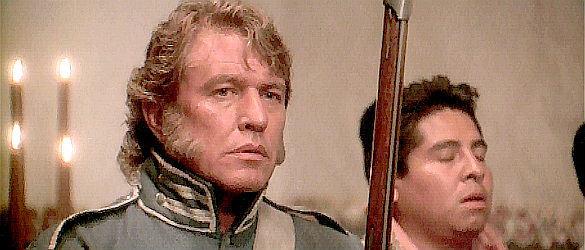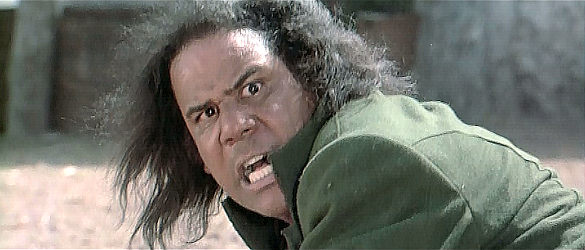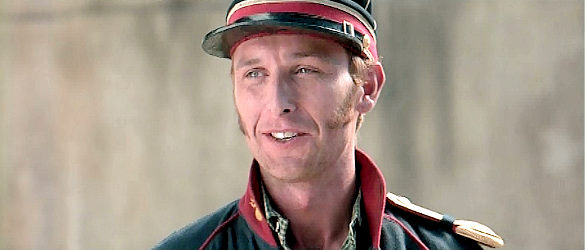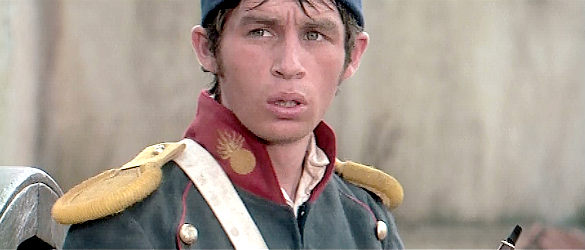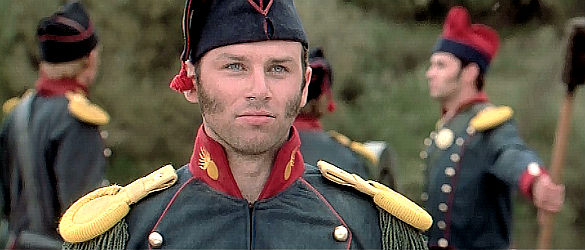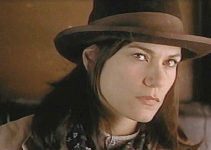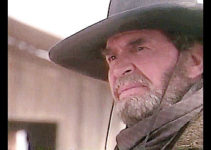 Tom Berenger is Sgt. John Riley, serving in the U.S. Army in 1846 and concerned about the treatment of the Irish-Americans serving under him.
Tom Berenger is Sgt. John Riley, serving in the U.S. Army in 1846 and concerned about the treatment of the Irish-Americans serving under him.
In fact, several are in the stockade, awaiting whipping, some merely because they wanted to go to mass.
As Irish-American Catholics, they’re not considered loyal enough to their Protestant commanders, who fear their allegiance lies more with Rome than the U.S. flag.
So Riley goes to mass himself, assembles some fellow Irish-American soldiers he finds there and heads back to camp.
He frees his men, then flees south, fully intending to return and take his punishment.
Instead, the fleeing Irish-Americans fall into the hands of Mexico revolutionaries fighting under a man named Cortina (Joaquim de Almeida).
Soon, war breaks out between the U.S. and Mexico. And Riley’s band of soldiers are faced with a choice: risk returning and being branded traitors or fighting as welcome allies in the Mexican army.
They choose the latter. And as more Irish-Americans desert the U.S. Army, they form the St. Patrick’s Battalion.
Meanwhile, Riley has fallen in love with a Mexican woman named Marta (Daniela Romo).
The problem there: Cortina considers her his own.
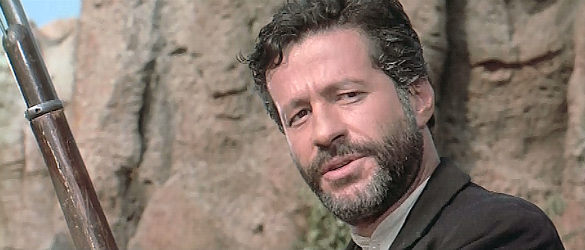
Joaquim de Almeida as Cortina, the Mexican revolutionary who becomes a soldier, then a revolutionary again in One Man’s Hero (1999)
Watching this, you get the feeling filmmakers were shooting for an Irish-American “Glory” about the heroic deeds of a band of mistreated U.S. soldiers.
If so, they failed. Failed miserably. In fact, this is a film that gets worse the longer it runs. Virtually nothing works over the final 45 minutes, but the melodrama sure soars.
Berenger, with his Irish accent, is barely bearable in the lead role. Patrick Bergan is atrocious as Gen. Scott. Carlos Carrasco’s Mexican bandit Dominguez came straight out of a comic book.
One of the biggest problems: Filmmakers don’t invest enough time letting us get to know the “boys” serving under Berenger. When they go into battle, you’re really not invested in their fate.
Instead, they saddle the film with a ridiculous love triangle subplot involving John Riley, Cortina and Marta. It does little to add to the film’s appeal; it contributes mightily to an absurd ending.
About the only thing going for the movie are its depiction of the Mexican-American War, seldom dealt with on film.
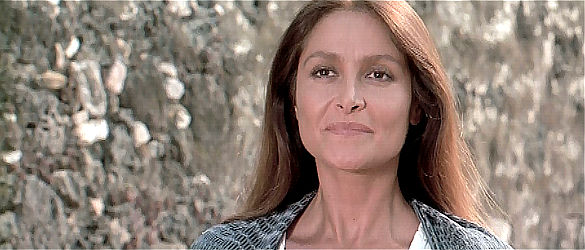
Daniela Roma as Marta, the woman who stirs the heart of Sgt. John Riley and Cortina in One Man’s Hero (1999)
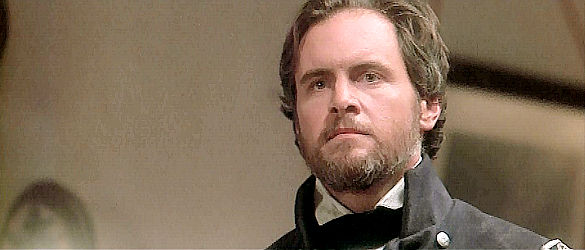
Mark Moss as Col. Benton Lacy, asking for mercy for the captured American deserters in One Man’s Hero (1999)
Directed by:
Lance Hool
Cast:
Tom Berenger … John Riley
Joaquim de Almeida … Cortina
Daniela Romo … Marta
Mark Moss … Col. Benton Lacy
Stuart Graham … Cpl. Kenneally
Gregg Fitzgerald … Paddy Noonan
Don Wycherley … Brian Athlone
Wolf Muser … Cpl. Schultz
Luke Hayden … Seamus McDougherty
Ilia Volok … Daniel Grzbalski
Patrick Bergin … Gen. Winfield Scott
James Gammon … Gen. Zachary Taylor
Carlos Carrasco … Dominguez
Stephen Tobolowsk … Capt. Gaine
Dermott Martin … Seamus Fitzgerald
Jason Hool … Peter O’Neil
Gary Hershberger … Eammon Daly
Steve Leone … John Daly
Jorge Bosso … Col. Maximo Nexor
Luis Lorenzo … Padre Varga
Prince Albert of Monaco … James Kelley
Vanessa Bauche … Flor
Perla De La Rosa … Juno
Runtime: 121 min.
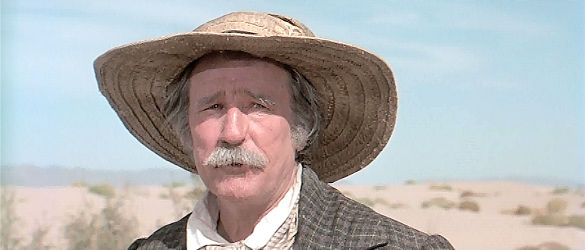
James Gammon as Gen. Zachary Taylor, preparing to lead U.S. forces into battle in One Man’s Hero (1999)
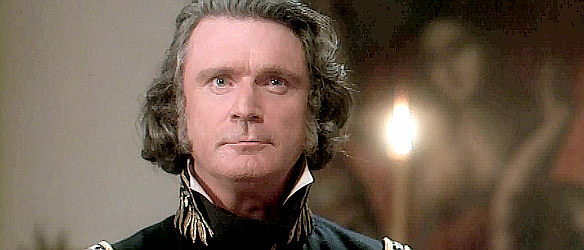
Patrick Bergin as Gen. Winfield Scott, wanting to set an example for his men in One Man’s Hero (1999)
Memorable lines:
Cortina: “Where would you go, sergeant? To the north, you are a traitor. To the south, you are an enemy. You are a man without a country, just like us.”
Cortina: “Enjoy my hospitality.”
John Riley: “For how long?”
Cortina: “Until I decide what to do with you?”
Mexican general: “You’re a man of great honor, sir. Why did you invade my country?”
Gen. Zachary Taylor: “Orders. You understand that.”
San Patrios soldier: “Back in Ireland, it was rain, rain, rain. Over here, it’s sun and sand and no bloody rain.”
San Patrios soldier #2: “In Poland, there is no sun.”
Soldier #1: “What about sand?”
Soldier #2: “No sand either.”
Soldier #1: “And you’re complaining.”
Cortina: “Let me tell you one thing, sergeant. It’s in the nature of man to fight for a reason. Somehow, I just ran out of them.”
John Riley: “Well, I’m sure you’ll invent one.”
Cortina: “Like patriotism?”
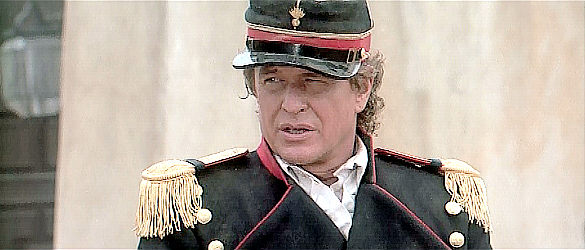
Tom Berenger as John Riley, commander of the St. Patrick’s Battalion in the Mexican Army in One Man’s Hero (1999)
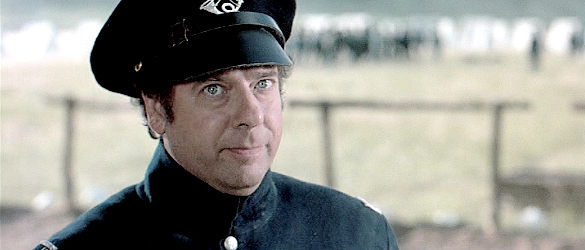
Stephen Tobolowsky as Capt. Gaine, the man who’s harsh discipline leads to Riley’s desertion in One Man’s Hero (1999)
